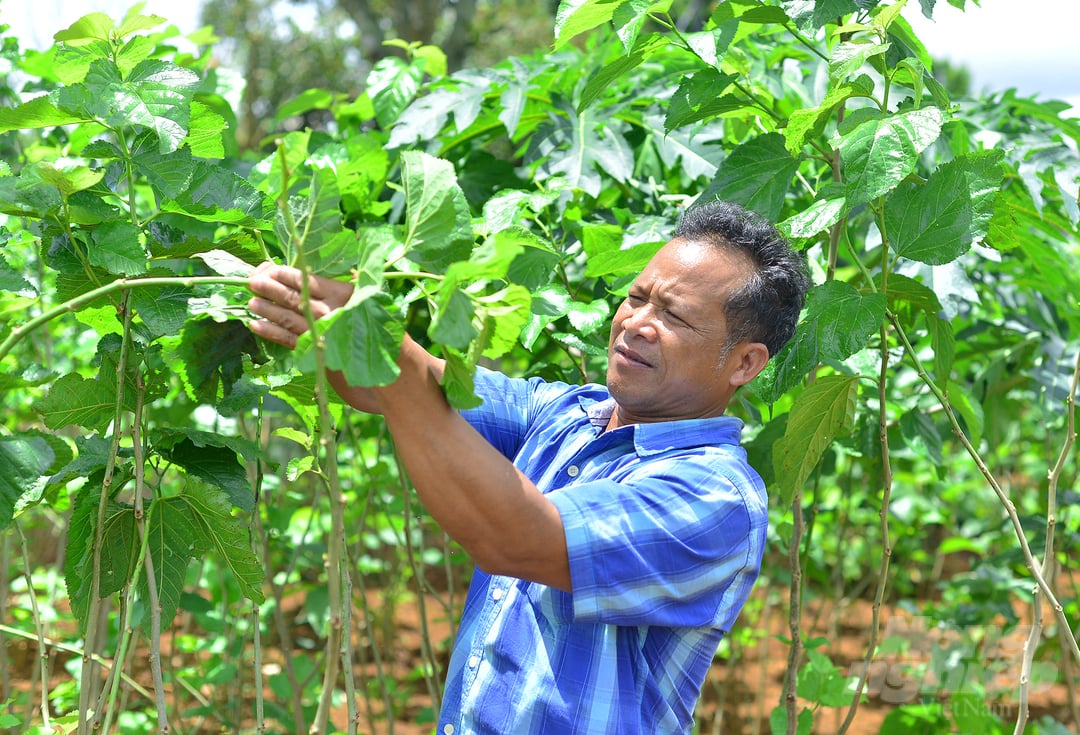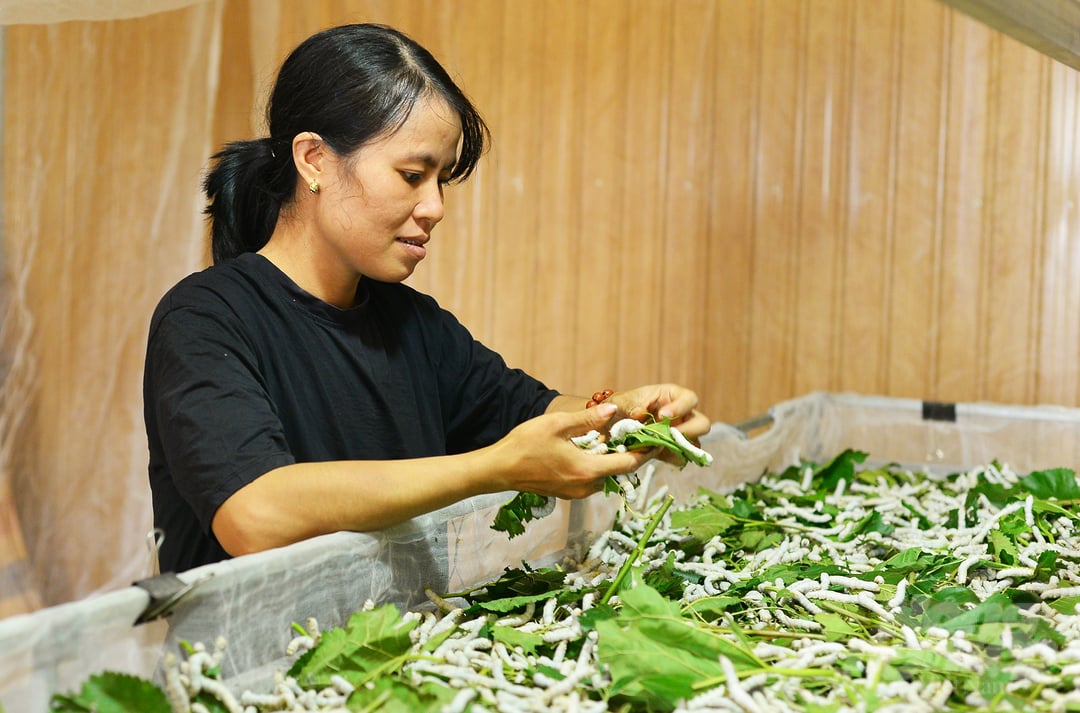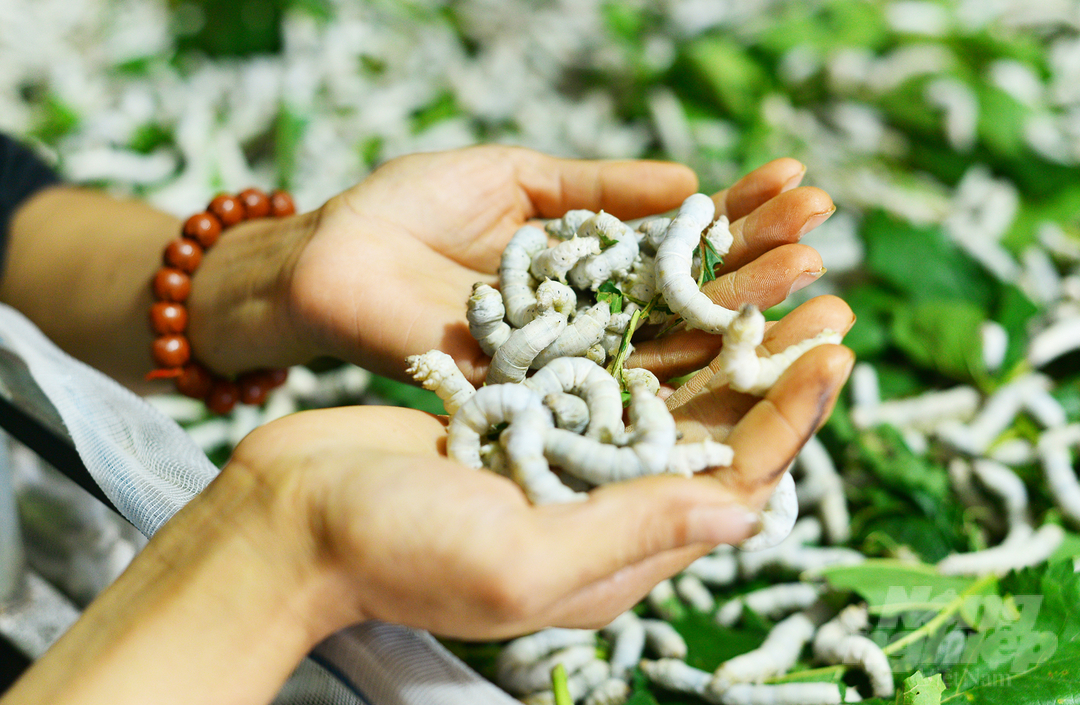These days, the family of Mrs. Nguyen Thi Nga, who lives in Da Pe village (Phuc Tho commune, Lam Ha district, Lam Dong province ) focuses on taking care of 10-day-old silkworms to ensure time to harvest cocoons and supply them to the establishment. purchase. Ms. Nga said that in the past, the family's economy depended entirely on the coffee garden. Therefore, when the price of coffee fell, life became difficult.
To improve her income, 5 years ago, her family converted 2 Sao (2,000m2) of old, inefficient coffee to growing mulberry and raising silkworms. Later, realizing that mulberry production brought a stable source of income, the family continued to convert 6 Sao of coffee to growing mulberries.

Thanks to growing mulberry to raise silkworms, people in Phuc Tho commune (Lam Ha district, Lam Dong) have a stable source of income. Photo: Minh Hau.
"Up to now, the family has a total of 0.8ha of the mulberry garden and ensures a regular food source for 4-5 boxes of silkworms/month," said Ms. Nguyen Thi Nga, adding that the family imports silkworms from different countries. establishments in the region and it are these same establishments that buy cocoons.
Currently, the price of silkworm cocoons is around 150,000 - 180,000 VND/kg, so Ms. Nga's family has a high income. Ms. Nguyen Thi Nga shared: "From the beginning of the year until now, thanks to growing mulberries to raise silkworms, the family has earned over VND 200 million. This income is much higher than that of growing coffee."
Like Mrs. Nga's family, Ms. Nguyen Thi Mien (Da Pe village, Phuc Tho commune) converted part of the coffee area to growing mulberry trees to raise silkworms. Mien shared, that the family has a total of 2.7ha of coffee and in 2012 converted 0.5ha of inefficient coffee to growing mulberry and raising silkworms.

Cultivation of mulberry and raising silkworms has helped farmers in mountainous communes earn hundreds of millions of dong each year. Photo: Minh Hau.
Talking about the effectiveness of the model, Mien said that her family imports silkworms from establishments in the region for 900,000 VND to 1 million VND/box. After 15-17 days of care, the cocoons can be harvested and sold to traders.
"If you grow coffee, you can only harvest one crop a year, but if you grow mulberry and raise silkworms, you will have money every month. This year, the mulberry has grown steadily, the silkworm variety is good, and the cococoons price is quite high, so the family's economy has improved a lot. Since the beginning of the year, the family has earned a net profit of over 100 million dongs," said Ms. Nguyen Thi Mien.
According to Mr. Long Dinh Ha Vuong, Head of Da Pe village (Phuc Tho commune), in the past, people in the village mainly grew coffee and when the price of coffee fell, it made life difficult for them many families. Currently, people have gradually converted to growing mulberry and raising silkworms for economic development. According to statistics, the whole village of Da Pe currently has about 90 households converting from coffee to growing mulberry to raise silkworms, with at least 0.1 ha of the mulberry area and 1 ha at most.

Investment capital for silkworm farming is not too high, so it is easy for farmers to implement. Photo: Minh Hau.
"Investment capital for growing mulberry and raising silkworms is not too high, so it is easy for people to implement. In particular, the cultivation of mulberry trees to raise silkworms helps people have a regular monthly income, so their life is stable. helping many households get rich," said Mr. Long Dinh Ha Vuong.
Mr. Tran Van Dat, Vice Chairman of Phuc Tho Commune Farmers' Association, said that in the past, to improve people's income, local authorities have mobilized people to change the structure of crops and livestock. They were especially converting the old and inefficient coffee area through mulberry cultivation and silkworm rearing. "The inefficient models of converting from coffee to mulberry over the years have brought great results. People are no longer hungry, and lack clothing. The rate of poor households in the locality has also decreased sharply." Mr. Tran Van Dat said.
Mr. Do Viet Hung, Deputy Secretary of the Party Committee of Phuc Tho commune (Lam Ha district, Lam Dong province) said that Phuc Tho commune belongs to region 1 Ethnic minority and mountainous region of Lam Dong province. Over the years, the locality has implemented many solutions to improve the quality of life of the people. Especially encourage and develop programs to convert crops, improve production value. The conversion of inefficient crop areas through mulberry and silkworm rearing has contributed to increasing income for the people. The poverty rate in the period 2015-2020 is 131 households and so far the number of poor households has decreased by 50%.
Source: Minh Hau - nongnghiep.vn






.png)